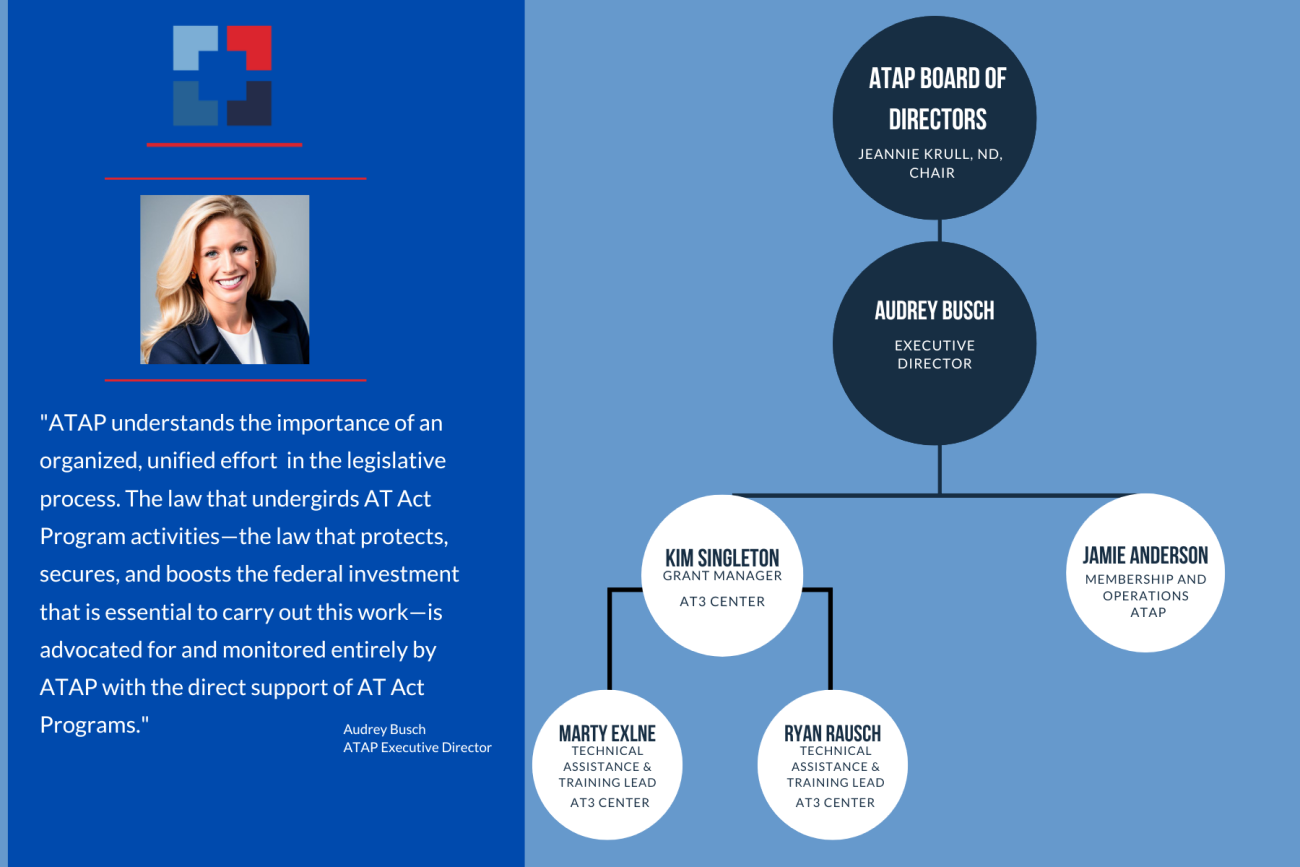
What is ATAP?
The Association of Assistive Technology Act Programs (ATAP) is a national, member-based non-profit organization, comprised of AT Act Programs funded under the Assistive Technology Act (AT Act). ATAP facilitates the coordination of AT Act Programs nationally and provides technical assistance and support to its members. Established in 1997, the organization strives to enhance the effectiveness of AT Act Programs on the national, state and territory, and local level. ATAP promotes the national network of AT Act Programs, represents the needs and interests of the programs, and serves as the national representative of AT Act Programs.
 Mission and Purpose
Mission and Purpose
Maintain and enhance a strong, effective, and efficient national network of AT Act Programs. Enable individuals with disabilities, service providers and others to learn about, access, and acquire assistive technology (AT) needed for education, employment, and community living. ATAP accomplishes its mission by
- Enhancing the effectiveness of AT Act Programs on the national, state, and local level.
- Providing a forum for member states and territories to study, deliberate, and act upon matters affecting the national network of AT Act Programs.
- Providing resources for the formulation and expression of the collective points of view of AT Act Programs on critical issues that impact access to and acquisition of AT.
- Serving as an advisory body to the Administration on Community Living, other federal agencies, organizations, and entities, on issues affecting access to and acquisition of AT.
- Providing a means of communication and joint action with other organizations promoting access to and acquisition of assistive technology.
- Supporting and participating in research and demonstration projects that increase access to and acquisition of assistive technology.
- Advocating for the enhancement of the national network of AT Act Programs, the reauthorization of the Assistive Technology Act and increasing federal appropriations for the Assistive Technology Act.
Organization Chart

“ATAP’s priority is the reauthorization of the Assistive Technology (AT) Act.
ATAP understands the importance of an organized, unified effort in the legislative process. The law that undergirds AT Act Program activities—the law that protects, secures, and boosts the federal investment that is essential to carry out this work—is advocated for and monitored entirely by ATAP with the direct support of State and Territory AT Act programs.”
Audrey Busch
ATAP Executive Director
- ATAP Board of Directors
- Chair, Jeannie Krull, ND.
- ATAP Executive Director, Audrey Busch
- ATAP/AT3 Membership and Operations Director,
Jamie Anderson - Grant Administration Lead, Kim Singleton, AT3 Center
- Training and Outreach Lead, Marty Exline, AT3 Center
- Training and Outreach Lead, Ryan Rausch, AT3 Center
- ATAP/AT3 Membership and Operations Director,
- ATAP Executive Director, Audrey Busch
Board of Directors

Jeannie Krull
Chair
North Dakota

Rick Anderson
Vice Chair
Arkansas

Laurie Brooks
Treasurer
Oregon

Maureen Melonis
Secretary
Colorado

Molly Kimmel
Board Member
Montana

Mystie Rail
Board Member
Alaska

Angela Standridge
Board Member
Texas

Kim Lilley
Board Member
Tennessee

Tobias Orr
Board Member
Nebraska

Tammy Koger
Past Chair – Ex Officio
North Carolina



 Mission and Purpose
Mission and Purpose


